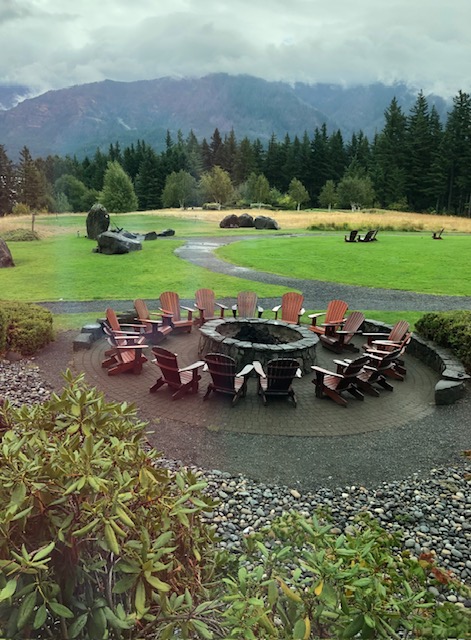Victoria Falls, Zimbabwe by Lorraine B. Wodiska
About Dr. Lorraine Wodiska
Professional Background
Training:

The blue sky/clouds, Australia by Lorraine B. Wodiska
Teaching:
I taught Basic Group Therapy at Johns Hopkins University for several years. When invited, I created and taught a course in Advanced Group Therapy as well.
For over 15 years, I have been offering half and full-day workshops at the American Group Psychotherapy Association conferences, in such areas as Teaching Group Therapy, Transgenerational Transmission of Trauma, Ethical Canine Assisted Psychotherapy, Neuroscience to Deepen Online Experiences, and most recently, Neuroscience and Instinctual Bias.

The Plum Tree Blossoms by Joan Metcalf
Service to the Community:
Service to the Professional Group Community:
- From 2024-2026, I will proudly serve as President of the American Group Psychotherapy Association.
- Before then, I served on the AGPA Executive Committee, as a Board Member, and for several years, as the Senior Co-Chair of the Open Sessions Committee for the Annual Connect Conferences.
- I was President (2016-2018) of the Mid-Atlantic Group Psychotherapy Association and a Board Member many years before and after that presidency.
- I was the National Exam Chair (2010-2020) and Board Member of the American Board of Professional Psychology in Group Psychotherapy (ABGP). I hold a diplomate in Group Psychotherapy and Psychology.
Therapeutic Interests
Group Therapy
I conduct group therapy sessions in Arlington, Virginia, and co-lead a group that meets only in virtual sessions.
In therapy groups, we strive to create an environment of emotional safety, where members can feel comfortable sharing the significant events of their lives and expressing thoughts, feelings, and experiences about themselves, one another, and me. Understanding the in-the-room relationships sheds new light on outside relationships.
One way of thinking about a group is to view it as a “living laboratory” of relationships. It is a place where you can experiment with new ways of relating to people and take interpersonal risks. We explore the meaning of what happens for you within relationships and the consequent reactions that get stirred up within you—and others in the group.
Because group therapy is a powerful therapeutic venue, people often “graduate into the group” after they have been in individual therapy for some time and are already comfortable with personal exploration and a deep understanding of themselves.
Groups are composed with the intention of having diversity in age, relationship status, race, and psychological issues. However, all groups are about relationships and that is our direct and indirect focus—understanding connections with those in the group, with those in your current life, and with those in your family of origin.

Newberg, Oregon by Lorraine B. Wodiska
Canine-Assisted Psychotherapy
Over the past years, I have been working with Stella and Teddy, my two, 10-pound Shih Tzus who have assisted me as “co-therapists.” Each has earned the status of Canine Good Citizen. As professional therapy dogs, they pick up emotional signals—sometimes before I do—and have taught me their signals to various effects on patients.
Additionally, for most people, the presence of an animal prompts the body to release serotonin and oxytocin, hormones that generate a relaxation and stress-reducing response. This frequently allows for a deeper engagement within the therapeutic process.

Arlington, VA by Lorraine B. Wodiska
Polyvagal Theory
My interest in neuroscience began with the impact I observed in Stella’s response to clients. Because dogs have similar brain structures as people, I became fascinated by the way neurobiology influenced and engaged feelings, even with the pups.
Polyvagal Theory posits that our nervous system is constantly evaluating risk in our physical and psychological environment and neurophysiological processes associated with feeling safe are necessary for social behavior.
When we are feeling unsafe—wherever we are—we use strategies to protect ourselves. When we feel safe, we can connect, engage, and communicate well with others.
When we feel fear, we prepare to move away from what we perceive as dangerous. In these times, in our anxiety, we react, judge, and use the strategies of “fight or flight.”
When we understand the role of our neural circuity, we take blame and shame out of the equation of our actions. It also offers a nonjudgmental path forward in terms of healing from the past and creating flourishing relationships.
Interpersonal Neurobiology
Interpersonal Neurobiology (INPB) is a partner to Polyvagal Theory, allowing me to incorporate both perspectives into my therapy work.
Perhaps surprisingly, the function of the brain is relational—that is, to engage with others. There is relational circuitry in the right brain so that your right brain limbic system is always reaching out to other right brain limbic systems in the room; and, neuroceptively (without conscious awareness and without words) picks up the “vibe” of the people and the space and then responds to what is sensed.
Whenever you are with another person (interpersonal), there is a neurological message which signals a biological response within the body (neurobiology). As a result, “pathways’ have been created since you were young and continue to impact today’s interactions with intimate relationships. Interestingly, you have little awareness of this moment-to-moment process. Exploring these well-worn neurological pathways leads us to an understanding of how you developed and allows us to create a healthier process.

New Zealand by Lorraine B. Wodiska
Certifications
- Group Psychology Diploma #6702 - American Board of Professional Psychology
- Certificate of Proficiency in the Treatment of Alcohol and Other Psychoactive - Substance Use Disorder Certificate #AD001336
- Certified Group Psychotherapist Certificate #3002 - National Registry of Certified Group Psychotherapists
- Psypact Mobility Number 7588
Memberships in Professional Organizations:
National:
- American Group Psychotherapy Association: President-Elect, Fellow, Certified Group Psychotherapist
- American Board of Professional Psychology in Group Psychology and Group Psychotherapy: Fellow, Past Board Member, Past National Examination Chair
- American Psychological Association: Member
Regional:
- Mid-Atlantic Group Psychotherapy Society: Member, Past President, and Past Board Member
- Maryland Psychological Association: Member and Fellow
- Northern Virginia Psychological Association: Member
